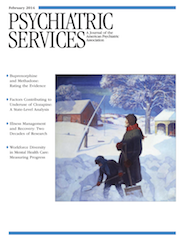GPs and New Compulsory Admission Procedures in France
To the Editor: On August 1, 2011, a new law reforming compulsory hospitalization measures (CHMs) was implemented in France (1). This new law aimed to develop compulsory community treatment procedures and to introduce review by a judge (2). Although a reform of CHMs was long expected in the French psychiatry field, numerous professionals expressed disapproval of the speed with which the new law was drafted and implemented (2). Such precipitance could notably disrupt physicians’ ability to correctly carry out CHMs.
In a single-center retrospective study, we collected all compulsory admission certificates (CACs) written by private-practice general practitioners (GPs) for outpatients referred to the psychiatric unit of our emergency department from August 1, 2010, to July 31, 2012—that is, one year before and one year after official implementation of the new law. We divided the CACs into two periods: those written before August 1, 2011 (before implementation of the new law) and those written after this date and officially underlined by the 2011 law. For both periods, we assessed whether each CAC was formally valid according to the previous law criteria, formally valid according to the new law criteria, or formally invalid according to both laws. We compared the proportions of invalid CACs in the two periods by using chi square tests. The study was approved by a national ethics committee.
A total of 119 CACs fulfilled the selection criteria: 57 CACs were written in period 1, and 62 were written in period 2. During period 1, 30% of CACs (N=17) were found formally invalid, compared with 52% (N=32) in period 2 (p<.05). Of the CACs in period 2, 21% met prerequisites of the previous law.
Our findings show that, locally, GPs’ skills in performing CHMs appeared significantly affected by implementation of the new law. In period 2, more than 20% of GPs continued to write CACs according to the requirements of the previous law. It appears that they ignored the existence of the new regulation, which supports the view that numerous professionals were insufficiently prepared for the change. However, the rate of invalid CACs was already high even before the change, because almost 30% of CACs were formally invalid in period 1.
Our study was conducted at only one center, and it is unclear whether this finding is local or reflects a more widespread issue. Nevertheless, the finding could point to a lack of training on CHMs among GPs. Many GPs are recurrently confronted by situations requiring CHMs, but these situations may not be routine enough to produce expert skills in writing CACs. Moreover, CHMs may be insufficiently addressed within continuing medical education programs.
Committing patients under invalid CHMs is equivalent to an unjustified privation of freedom, which might expose physicians to medico-legal consequences and which raises important ethical concerns. In several European countries, only trained psychiatrists can carry out CHMs (3). In the other countries, including France, any physician can do so. However, physicians’ skills in regard to CHMs should be more carefully examined.
1 Law of July 5, 2011, relating to the rights and the protection of people who are given psychiatric care [in French]. Available at www.legifrance.gouv.fr/affichTexte.do?cidTexte=JORFTEXT000024312722&dateTexte&categorieLien=id. Accessed Sept 4, 2013Google Scholar
2 : The evolution of laws regulating psychiatric commitment in France. Psychiatric Services 64:609–612, 2013Link, Google Scholar
3 : Compulsory Admission and Involuntary Treatment of Mentally Ill Patients—Legislation and Practice in EU Member States: Final Report. Mannheim, Germany, Central Institute of Mental Health, 2002. Available at ec.europa.eu/health/ph_projects/2000/promotion/fp_promotion_2000_frep_08_en.pdfGoogle Scholar



